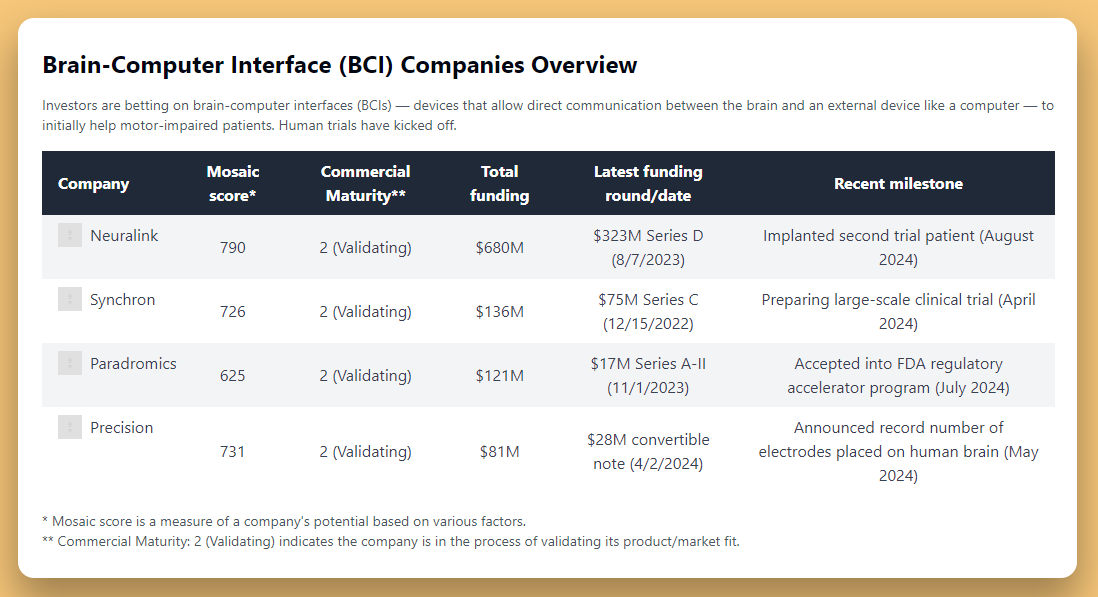Live Testing Buy/Sell Signal Alerts Started - ICYMI - 9 Game-Changing Technologies Shaping the Future
🔥 I have began live testing Signal Telegram Alerts. 🔥
Hi fellow investors and welcome back for some Quant data driven Alerts!
My Alert Quant is scanning 20,000 US Stocks to only filter the top signals. I'm thrilled to introduce Alert Quant, a tool that scans thousands of stocks to filter out the top signals so you don’t have to. I'm committed to continuously fine-tuning and improving it over time. With over 20,000 US stocks out there, finding the best opportunities is as good as searching for a needle in a haystack. That's where Alert Quant comes in.
Here's what you can expect:
Phase 1: Live testing and launch of Daily Signal Alerts
With simplified details to cater for beginners who wants straightforward guidance without the complexity.
Phase 2: Daily Intraday Alerts - High risk for high reward
Phase 3: Weekly Buy-and-Hold and Short Swings Alerts - Conservative
Aimed at steady mid and long term portfolio growth
Phase 4: Bitcoin only daily alerts - High risk for high reward
These come with higher risk but the potential for significant rewards.
Phase 5: FinTech / Blockchain TBA - Very High risk
These are very high risk but could offer groundbreaking potential for rapid capital growth.
The configuration is base on a $10 000 capital account and 2% position allocation to simplify decision making and risk management.
9 Game-Changing Technologies Shaping the Future
As I look ahead to 2025 and beyond, several emerging technologies are poised to transform industries and societies in profound ways. From AI-powered weather prediction to advanced nuclear propulsion for space exploration, these innovations promise to tackle major global challenges and unlock new possibilities. This article explores 9 game-changing technologies that are attracting significant investment and development:
1. AI Weather Prediction
Extreme weather events are ranked as the #1 long-term global risk over the next decade, with the potential to cause massive economic damage and disruption. As climate change intensifies, the ability to accurately forecast severe weather is becoming increasingly critical.
Artificial intelligence and deep learning models are rapidly advancing the field of weather prediction, enabling faster and more accurate forecasts at both local and global scales. Key developments include:
FourCastNet by Nvidia: A physics-ML model that generates 7-day forecasts in under 2 seconds
GraphCast by Google DeepMind: Produces 10-day forecasts with high accuracy in less than 1 minute
Aurora by Microsoft Research: A 1.3 billion parameter foundation model of the atmosphere
NeuralGCM by Google Research: Combines AI and physics models to project climate conditions decades into the future
StormCast by Nvidia Research: Simulates extreme weather events at the kilometer scale
These AI models are able to learn from historical weather data and generate projections much faster than traditional physics-based models that rely on supercomputers. The improved speed and accuracy could be game-changing for industries like:
Insurance: Better assessing and pricing weather-related risks
Energy: Optimizing renewable energy production and grid management
Agriculture: Improving crop planning and management
Transportation: Enhancing safety and efficiency of air, sea, and ground transport
Several startups are also targeting this space with industry-specific solutions:
Jua: AI model for 16-day weather forecasts, focused on energy trading
Atmo: AI-powered precision forecasting for government, aerospace, energy, and agriculture
WindBorne Systems: Long-duration balloons for atmospheric data collection
Reask: AI-powered natural hazard modeling for insurance and financial services
As these technologies mature, they could help protect trillions of dollars of global GDP impacted by weather, while also improving climate change projections and mitigation strategies.
Nvidia ( NVDA 0.00%↑ ): Nvidia is involved in AI-driven weather forecasting through its StormCast model, which simulates extreme weather events
Spire Global ( SPIR 0.00%↑ ): Spire uses AI and satellite data for advanced weather forecasting, providing global coverage and detailed atmospheric profiles
2. Ultra-Deep Drilling
The quest for clean, renewable energy sources is driving innovation in geothermal power extraction. While geothermal currently accounts for less than 0.2% of global energy production, recent advances in drilling technology are opening up vast new possibilities.
Ultra-deep drilling aims to tap into "superhot rock energy" by reaching depths of 6+ miles into the Earth's crust, where temperatures reach around 750°F. At these extreme depths, water becomes "supercritical," holding 5-10 times more energy than steam in conventional geothermal wells.
Key players in this space include:
Quaise Energy: An MIT spinout using millimeter wave drilling technology that can vaporize rock. They aim to generate deep geothermal energy from pilot wells by 2026.
GA Drilling: Developing plasma drilling technology that uses extreme heat energy to pulse through rock. They've secured backing from major oil & gas drilling contractors.
The potential of ultra-deep drilling has attracted interest from major tech companies like Google, which recently agreed to buy 115 MW of geothermal energy to power its data centers in Nevada. As the technology progresses, it could provide a consistent, 24/7 clean energy source available virtually anywhere on Earth.
Transocean Ltd. ( RIG 0.00%↑ ): A leader in ultra-deepwater drilling, recently securing a significant contract for its drillship operations
Quaise Energy: Although not publicly traded, Quaise is pioneering ultra-deep drilling technology using millimeter waves to unlock geothermal energy
3. AI Agent Marketplaces
The explosion of generative AI capabilities is giving rise to a new paradigm in software: AI agents. These language model-based bots can tackle complex tasks on behalf of users with minimal human intervention. As the technology matures, I'm likely to see the emergence of AI agent marketplaces that enable dynamic integration and collaboration between specialized agents across platforms.
Key developments in this space include:
Microsoft Copilot: Offering a limited preview of API plugins to interact with external tools
Slack: Launched an "agent hub" integrating AI agents from Salesforce and third-party partners
Emergence: A startup with $100M+ in funding targeting agent orchestration and routing
Future software applications may be defined by their agent architectures, dynamically creating new AI agents as needed and facilitating interaction between internal and external agents to accomplish tasks. This could lead to a new ecosystem of specialized AI agents offered as plug-in solutions by software companies.
The potential impact is immense, with AI agents potentially handling a wide range of tasks at a fraction of the cost of human labor. However, this also raises important questions about job displacement and the need for new skills in the workforce.
Microsoft ( MSFT 0.00%↑ ): Microsoft is heavily involved in AI agent marketplaces with its Copilot agents and integration capabilities.
Slack (owned by Salesforce): Slack has launched an "agent hub" integrating AI agents from various partners.
4. Advanced Nuclear Propulsion
As space exploration ambitions grow, the limitations of conventional chemical rockets for long-distance travel are becoming apparent. Advanced nuclear propulsion systems promise to enable faster interplanetary travel and deeper space exploration.
Recent developments include:
NASA and DARPA selecting Lockheed Martin and BWX Technologies to test a nuclear thermal rocket, promising 2-3x more efficiency than chemical propulsion
Ultra Safe Nuclear awarded a $5M contract by NASA to develop nuclear thermal propulsion systems in collaboration with Blue Origin
While still experimental, fusion propulsion is also gaining traction, with startups like Helicity Space securing funding from aerospace giants Lockheed Martin Ventures and Airbus Ventures.
These technologies could dramatically reduce travel times to Mars and beyond, opening up new possibilities for space exploration and resource utilization.
Lockheed Martin ( LMT 0.00%↑ ): Selected by NASA and DARPA to develop nuclear thermal rocket technology, promising greater efficiency for space exploration.
BWX Technologies ( BWXT 0.00%↑ ): Partnered with Lockheed Martin for nuclear propulsion projects.
5. Biocomputing
The incredible efficiency of the human brain - performing an exaflop (1 billion-billion calculations per second) using only 20 watts of power - is inspiring a new approach to computing. Biocomputing, or "biological intelligence," involves combining human neurons with silicon chips to support computational tasks.
While still in early stages, biocomputing shows promise for dramatically improving energy efficiency compared to conventional processors. This could have major implications for reducing the massive energy consumption of data centers and AI training.
Key players in this space include:
Cortical Labs: Launched "Neuroplatform," connecting 16 human brain organoids to create a biocomputer
VERSES AI: Partnering with Cortical Labs to develop algorithms leveraging their biological chips
Government agencies are also taking notice, with the NSF investing $14M in bioengineered systems and ethical biocomputing research.
Cortical Labs: A startup developing biological computers that combine human neurons with chips, aiming for more energy-efficient computing.
In-Q-Tel: While not a stock, this strategic investor backs biocomputing initiatives like Cortical Labs.
6. Brain Manipulation Tech
Brain-computer interfaces (BCIs) are rapidly approaching commercialization, with several companies conducting human trials:
Neuralink: Implanted its second trial patient in August 2024
Synchron: Preparing for a large-scale clinical trial
Paradromics: Accepted into an FDA regulatory accelerator program
Blackrock Neurotech: Announced a record number of electrodes placed on a human brain
Advances in AI are improving the interpretation of neural signals, enhancing the potential of BCIs to support rehabilitation and communication for individuals with movement and neurological disorders. Recent breakthroughs include:
Individualized algorithms cutting the duration of Parkinson's symptoms in half
97.5% accuracy in translating neural activity to speech for an ALS patient
Looking ahead, less invasive devices may emerge to tackle conditions like depression, OCD, and ADHD. This sets the stage for a massive new category of medical and consumer brain manipulation technology in the next 10-15 years.
Boston Scientific Corporation ( BSX 0.00%↑ ): A major player in neurotechnology, focusing on neuromodulation devices for neurological disorders
Abbott Laboratories ( ABT 0.00%↑ ): Known for developing advanced neuromodulation systems that improve patient experiences
7. Quantum-Optimized Portfolios
Quantum computing, while still nascent, is attracting significant investment, particularly from the financial services sector. Banks see potential for quantum computers to revolutionize tasks like:
Portfolio optimization
Risk management
Fraud detection
Credit scoring
While more powerful quantum computers are needed for broad application, early pilots have shown promising results. Startups offering quantum computing solutions for finance are growing, with companies like Quantinuum, Classiq, Multiverse Computing, and QC Ware forming partnerships with major financial institutions.
As the technology matures over the next 5-10 years, it could unlock new levels of efficiency and performance in financial modeling and decision-making.
D-Wave Systems ( QBTS 0.00%↑ ): A leading quantum computing company with a focus on financial services applications
Microsoft ( MSFT 0.00%↑ ): Also active in quantum computing through its Azure Quantum platform
8. Cellular & Epigenetic Reprogramming
As populations rapidly age worldwide, longevity tech is on the rise. Cellular and epigenetic reprogramming - altering the gene expression of cells without changing the genes themselves - is emerging as a leading approach to extending the human lifespan.
Key players in this space include:
Altos Labs: Backed by Jeff Bezos with $3B in funding
Retro Biosciences: Raised $180M with investment from Sam Altman
NewLimit: Co-founded by Coinbase's Brian Armstrong with $60M in funding
These technologies promise new treatment approaches for age-related conditions, potentially reducing the massive healthcare spend associated with chronic diseases. As the field matures, expect increased involvement from pharmaceutical companies looking to develop new medicines targeting the fundamental processes of aging.
Altos Labs: Backed by prominent investors like Jeff Bezos, focusing on cellular reprogramming to extend human lifespan
Retro Biosciences: Engaged in developing technologies to reverse cellular aging processes
9. GPS-less Navigation Systems
GPS disruptions through jamming and spoofing are increasingly threatening modern navigation and defense systems. This has spurred development of Alternative Positioning, Navigation & Timing (AltPNT) systems, including:
Multi-sensor fusion: Integrating multiple independent PNT sources
Alternative space-based systems: Using low Earth orbit (LEO) satellite constellations
Non-radio frequency PNT: Leveraging magnetic, inertial, visual, or celestial navigation
Garmin Ltd. ( GRMN 0.00%↑ ): Known for its navigation systems and exploring alternative positioning technologies.
Trimble Inc. ( TRMB 0.00%↑ ): Specializes in advanced positioning systems beyond traditional GPS.
Startups in this space are attracting attention from aerospace & defense companies and government agencies:
Mesa Quantum: Using quantum sensing for PNT applications
Satelles: Acquired by Iridium for $115M
Xona Space Systems: Developing a LEO satellite constellation for high-precision PNT
TrustPoint: Working with Airbus on quantum sensors as GPS backup for aircraft
Q-Ctrl: Awarded contracts from SpaceWERX for AltPNT applications
These technologies will be crucial failsafes against GPS outages, which the US estimates would incur $1B a day in economic damages.
Disclaimer: This article is for informational purposes only and does not constitute investment advice. Always do your own research and consider your financial situation before making investment decisions.
Remember what goes up must come down (eventually)
Stay safe and invest wisely and this is in no mean financial advice. [Full Disclaimer]Thank you for supporting this newsletter. It will keep improving.
Harry




























